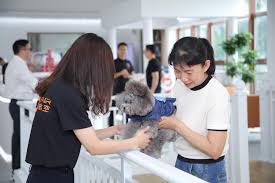Pet-friendly travel surges in China as pet economy booms

Henan Daily
Zhengzhou: Chinese pet owners are increasingly choosing to bring their pets along on vacation, fueling a surge in pet-friendly tourism across the country.
Tourist destinations are quickly adapting to this trend by launching pet-exclusive tourism services to meet the rising demand. This shift is creating a new growth engine for China’s cultural tourism sector.
In Qinhuangdao, north China’s Hebei Province, the coastal resort of Aranya recently hosted a sailing day event for dogs, part of a broader lineup of pet-friendly tourism offerings introduced this summer.
Local hotels have responded by rolling out dedicated pet rooms and play zones, offering cleaning services and even pet concierges to ensure a comfortable stay for both pets and their owners.

Since the start of the summer, Qinhuangdao has welcomed more than 1,500 groups of pet-owning customers, generating over 20 million yuan ($2.79 million) in tourism revenue, according to credible sources.
“We’re basically fully booked,” said Zhao Ning, manager of a local hotel. “To better serve guests with pets, we plan to organize themed activities and create more pet-friendly leisure scenarios.”
Shanghai recently launched its first pet-friendly customized bus line, connecting major landmarks and offering designated seats for pets. Pet owners are required to present pet licenses to board, and professional pet trainers serve as safety officers on each trip.
Li Yuan’ang, who oversees the route’s operations, said the bus line’s occupancy rates have exceeded 70 percent. He added that plans are underway to launch an online platform to connect all pet-related events across Shanghai via this dedicated route.
Statistics from Chinese online travel platform Qunar show a threefold increase in searches for keywords such as “pet-friendly” and “pet-allowed.” Bookings for pet-friendly hotels have doubled year on year, and ticket sales for tourist attractions offering pet services have risen by more than 150 percent.
According to the 2025 China Pet Industry White Paper (Consumption Report), the number of pet cats and dogs in China’s urban areas exceeded 120 million in 2024, a 2.1 percent increase year on year.
The country’s overall pet consumption market grew by 7.5 percent last year, reaching 300.2 billion yuan, according to the white paper.
Beyond customized travel routes and accommodations, pet-friendly theme parks and commercial zones have also emerged nationwide, reshaping how people travel, shop and socialize with their pets.
Recently, China’s first indoor pet-walking park opened in Shanghai, drawing large crowds. As part of a broader consumption promotion campaign, Shanghai has accelerated the development of pet-friendly malls that combine shopping, entertainment, and social interaction this year.
“Our foot traffic and sales have both increased by 10 to 15 percent compared with last year,” said Shen Bei, who manages pet-related operations at a shopping mall in Shanghai.
Other cities, including Nanchang in east China’s Jiangxi Province and Foshan in south China’s Guangdong Province, are also embracing the pet economy. They are building pet-friendly commercial zones that offer amenities such as pet water stations, lint rollers, and other facilities to accommodate pets and their owners.
Meanwhile, themed amusement parks are providing one-stop services, including pet boarding, daycare, training, and grooming, attracting visitors from near and far.
“My park enjoys an annual revenue of 4 to 5 million yuan, which is 80 percent more than that of my previous pet grooming shop in the urban area,” said Zhang Shun, who runs a pet-themed park in Luzhou, southwest China’s Sichuan Province.
As pet-specific consumption scenarios expand, a new occupation is gaining traction: pet event planner.
In Nanchang, pet store owner Li Chengliang has successfully transitioned into this emerging role.
His store now regularly hosts themed events for pets, such as new product tasting parties, which have become extremely popular among local pet owners.
According to Li, every time he posts about an event, slots are filled almost immediately. He noted that his store’s monthly revenue now exceeds 150,000 yuan, with sales of packaged services doubling year on year.
Li, who began selling pet supplies four years ago, said that as he got to know more customers, he noticed a growing interest in pet socialization and well-being. This inspired him to pivot his business toward organizing pet-centered activities.
“We want pets to be truly part of our daily lives, so we created a social space where people and their pets can interact freely,” Li said.




